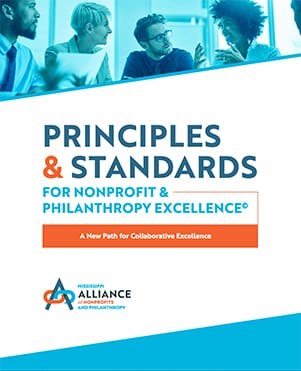Principles & Standards
For Nonprofit & Philanthropy Excellence
The 12 Accountability Principles
5. Governance
About
Board Characteristics & Qualifications
1. Board members are responsible for fully understanding their legal and fiduciary obligations. This includes upholding the organization’s mission and using its resources wisely and in accordance with the law. Additionally, board members should actively develop an understanding of ongoing activities, finances, business model and changes in the operating environment of the organization. FS
2. Board members should value diversity and understand the role of board participation and the importance of including diverse groups of people in the current and future success of the organization’s work. The board should be diverse in its makeup to be reflective of its community and have a written plan to maintain diversity. FS
Board Composition
3. Charitable boards should be made up of individual volunteers who are committed to representing the best interests of the organization, its mission and the community it serves. FS
4. The board should consist of members who represent the organization’s constituents, including business and public leaders who: influence decisions and resources, provide effective governance, generate needed resources and are actively involved in meeting the organization’s needs. The board should build strong relationships with local, state and federal officials where possible. FS
5. To be open to new viewpoints and community members, boards should seek out new potential board members from outside the organization’s traditional circles and should include board representatives from the communities the organization serves.
6. To allow for sufficient deliberation and diversity of perspectives, boards should consist of no fewer than five individuals all of whom are unrelated to each other or to staff. FS
7. Boards must have a chair and a treasurer (with financial knowledge), and should have a vice-chair and secretary, all chosen by and from the board of directors. No one should occupy more than one officer position in the same organization at the same time. FS IRS
8. If staff membership on the board is deemed necessary, it should be limited to the executive director, who should not serve as the chair, vice-chair, secretary, or treasurer. If a staff member serves on the board, he/she should not vote on issues regarding his/her compensation, benefits or other decisions pertaining to their own personal gain.
Board Responsibilities
9. Charitable board members are responsible for upholding the organization’s mission and using its resources wisely and in accordance with the law. FS
10. The board should establish a process, including the committee or persons responsible for implementing the process, for selecting new board members that will ensure adequate infusion of new ideas and community perspectives, while preserving institutional memory. FS
11. All new board members should participate in a board orientation and new member training prior to and separate from their first regularly scheduled board meeting. Board members should gain a full understanding of their board roles and responsibilities to the organization and to the public by being provided with FS:
• a clear set of expectations and responsibilities,
• bylaws, articles and other key documents of the organization, and
• ongoing opportunities to discuss and review responsibilities.
12. Board members are responsible for keeping suitably informed in order to actively participate in decision-making and in carrying out their duties in the following areas FS:
• Strategic planning
• Policy approval and ongoing review
• Annual review of the executive director’s performance and compensation
• Succession planning
• Setting of compensation structure
• Annual budget and revenue plans
• Financial procedures
• Risk management
• Regulatory filings
13. Board members are responsible for the ongoing financial health of the organization and should understand the content and significance of the organization’s financial statements and audit.
14. To demonstrate personal stake in the organization, board members are expected to volunteer their time, make personal financial contributions to the nonprofits and philanthropies as well as to raise funds from external sources. FS
15. Board members should receive no monetary compensation for their board duties other than reimbursement for board-related expenses. FS
16. Board members are responsible for making decisions in the interest of the organization and not in the interest of another entity, including themselves. The board should establish and adopt conflict of interest policies regarding board members, staff, volunteers, consultants and other contractors, and adhere to these policies in all dealings. The policies should include an obligation of each board member to disclose all material facts and relationships and refrain from voting on any matter when there is a perceived conflict of interest. FS
17. The board should establish and sign a written code of ethics regarding board members, staff, volunteers, consultants and other contractors and adhere to the code in all dealings.
18. Board members should be willing to publicly advocate for the organization to help widen the organization’s reach and develop connections with the community and its leaders.
Board Operations
19. Board meetings should be held at least on a quarterly basis and regular attendance should be expected. These meetings should have a printed agenda, and meeting minutes should be recorded and distributed to the board prior to the next meeting. FS
20. Boards should adopt practices that maximize participation, including accommodating remote or electronic participation in meetings, deliberations or decision-making.
21. The board chair is responsible for presiding over the board meetings. The board chair should also make sure that board members have access to key organizational documents and training. The board chair should pay particular attention to helping the board be aware of its obligations with regard to conflicts of interest, board attendance, board evaluation and compliance with board policies.
22. Boards should organize committees as needed to effectively carry out their roles and responsibilities. An audit and finance committee, or a similar functioning committee, should be established to oversee compliance and ensure that appropriate financial controls are in place. FS
23. Every two to three years, the board should review the organization’s bylaws and mission statement. If deemed necessary, these should be amended to reflect organizational growth and development and the ability to respond to changing community needs. Changes to by-laws and mission statement should be submitted to proper federal and state regulatory agencies. Boards should ensure that by-laws and policies address term limits on the board (how long a board member can serve before mandatory rotation off the board), number of terms that a board member can serve and expected attendance requirements at board meetings (including the ability to remove board members who fail to meet attendance requirements) and the organization’s sponsored events. FS
24. The board should ensure that the organization has a strategic plan that includes clear benchmarks and outcomes; It should be reviewed annually to include an evaluation of effectiveness and updated when needed.
25. Every year, the board should review and approve an annual budget for the organization. FS
26. Annually, the board should conduct a performance review of the executive director. The executive director’s performance should be assessed in light of organizational accomplishments and the total compensation package should reflect his/her performance as well as comparable industry standards. FS
27. The board should establish an organizational succession plan to maintain daily operation during the time of a change in executive or board leadership.
28. The board of directors, led by the board chair, should annually evaluate itself through a survey to the board members and a subsequent discussion of the results with intention of improving governance practices.

